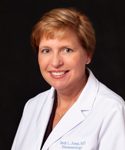
Blue Planet Studio / shutterstock.com
CHICAGO—The pre-clinical rheumatology curriculum at the University of North Carolina (UNC) School of Medicine, Chapel Hill, used to consist mainly of portions of a musculoskeletal course, with up to only three instructional hours, and not always with a rheumatologist in the room with students. Systemic autoimmune diseases were never fully discussed in any of the pre-clinical blocks.
Feedback from a focus group of third-year students told a fairly grim story. Students felt they weren’t learning what they needed to know. One student lamented that lupus seemed to pop up all the time and wished someone would “take 25 minutes and tell me what lupus is.”
“They felt autoimmunity was everywhere, and they didn’t know what it was,” said Beth Jonas, MD, professor of medicine and rheumatology fellowship director at UNC. “People were peppering [the subject] through the curriculum, but it wasn’t adequately covered.”
That has changed, said Dr. Jonas at the 2018 ACR/ARHP Annual Meeting. A grant from the Rheumatology Research Foundation led to a project that produced sweeping improvements in how the medical school teaches rheumatology, including an integration of basic science and clinical knowledge buttressed by email tests to heighten retention.
Students felt they weren’t learning what they needed to know.
An opportunity presented itself when the overall structure of medical training at the school was overhauled. Educators performed curriculum reforms that would not only prepare students for the Step 1 exam and their rotations in clinical medicine, but also boost enthusiasm about the study of rheumatic disease and increase the face time of students with actual rheumatologists.
Rheumatology coursework is now part of the multi-organ synthesis block. It starts with a pretest, and then covers four diseases:
- Lupus, because it’s considered the prototypic multisystem disease and is crucial to understand;
- Systemic vasculitis, seen as a way to teach vessel size and pathology concepts;
- Systemic sclerosis, which allows instructors to teach patterns of organ involvement and other concepts; and
- Systemic juvenile idiopathic arthritis, an entrée into pediatrics and autoinflammatory disorders.
Teachers from many disciplines—rheumatology, nephrology, gastrointestinal and infectious diseases, for example—all participate, Dr. Jonas said.
The lupus curriculum includes advance reading, large group sessions on, for example, the kidney in lupus, and small group sessions focused on clinical reasoning.
“The question is, how do we capture and reinforce these concepts and knowledge that [will] be relevant to this multi-organ synthesis course?” she said.
The curriculum has also started to use an online tool called Tar Heal Quest (a play on the Tar Heels, UNC’s team name), which asks students questions by email to reinforce what they’ve learned. It’s based on the idea of spaced education—that repeating information over time improves knowledge retention and that testing tends to work better for retention than simply studying.
The tool, which is not mandatory, includes 10–15 questions on material presented in most of the organ system blocks, with topics chosen for relevance to rheumatic disease. Two questions are sent daily, and after students answer, they’re given the right answer immediately with a rationale. When a student answers a question correctly twice consecutively, the question is retired. Questions answered incorrectly are repeated after two days, and questions answered correctly once after five days.
Dr. Jonas said almost all students participated in at least some of the questions even though they didn’t have to. Scores on a pretest, in which this material was covered, were higher after the tool was launched, but not significantly so.
“I don’t think we can say anything statistical about this, but I think it’s interesting that the scores in the third cohort were better,” Dr. Jonas said. “We do know students were more prepared in terms of their small groups, and that was very evident because they had seen this information time and again over the course of the curriculum.”
Johns Hopkins
Uzma Haque, MD, assistant professor of medicine at Johns Hopkins, Baltimore, said she saw the need to improve the training of internal medicine residents on musculoskeletal (MSK) topics, an area in which students historically report low confidence and a lack of skill.
Professors at Johns Hopkins used a six-step approach to develop the curriculum, an approach first described several years ago. It involves identifying the problem and assessing needs, setting goals and more specific objectives within those goals, education strategies, implementation, evaluation and feedback. Each step feeds back into the other steps so the curriculum continues to improve, Dr. Haque said.
The curriculum was loaded into the Physician Education and Assessment Center, a national platform used by 294 internal medicine programs in the U.S., making it one of the most widely used such tools. When Dr. Haque started her project, there were only two MSK modules, one on back pain, and one on knee and hip pain.
A crucial factor is that the program features intrinsic improvement mechanisms; outcomes are measured and analyzed, and a module isn’t considered complete until students have formally provided feedback.
“There are built-in analytics to evaluate data and outcomes by year of training and by training programs,” Dr. Haque said. “In fact, there is an existing and functional PEAC [the Physician Education and Assessment Center] biostatistical team that helps us look at this information anytime we want to.”
Pre- and post-test scores showed statistically significant improvement. There were no significant differences in the pre- vs. post-test performance by year. But the knowledge gained was highest among postgraduate year 1 residents, Dr. Haque said, “suggesting such intervention should be implemented early in training and consolidated over the last two years of residency.
“Further studies are required to evaluate whether knowledge gained from this intervention is durable and translates into improved care for patients with MSK complaints,” she concluded.
Thomas R. Collins is a freelance writer living in South Florida.



